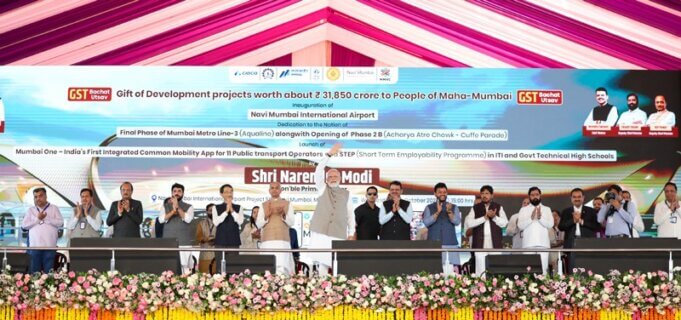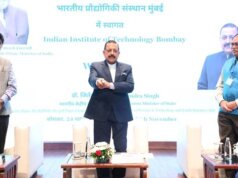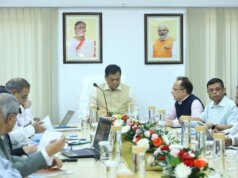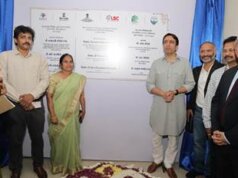Prime Minister Shri Narendra Modi inaugurated the Navi Mumbai International Airport and also launched and dedicated various developmental projects in Mumbai, Maharashtra. Underscoring that Mumbai’s long wait has ended with the city now receiving its second international airport, the Prime Minister highlighted that this airport will play a major role in establishing the region as one of Asia’s largest connectivity hubs. He also remarked that Mumbai has now received a fully underground metro, which will make travel easier and save time for commuters. Shri Modi described the underground metro as a living symbol of a developing India and noted that in a bustling city like Mumbai, this remarkable metro has been constructed underground while preserving historic buildings. He extended his congratulations to the workers and engineers involved in the project.
Underlining that India offers countless opportunities for its youth, the Prime Minister highlighted the recent launch of the Rs 60,000 crore PM Setu scheme aimed at linking numerous ITIs across the country with industry. The Maharashtra government has introduced new programs in hundreds of ITIs and technical schools. Through these initiatives, Shri Modi said, students will receive training in emerging technologies such as drones, robotics, electric vehicles, solar energy, and green hydrogen. He extended his best wishes to the youth of Maharashtra.
Shri Modi stated that today’s event continues the momentum of India’s development journey. He highlighted that the Navi Mumbai International Airport is a project that reflects the vision of a developed India. Built on the land of Chhatrapati Shivaji Maharaj, the airport is shaped like a lotus flower, symbolizing culture and prosperity. The Prime Minister remarked that this new airport will connect Maharashtra’s farmers to supermarkets in Europe and the Middle East, enabling fresh produce, fruits, vegetables, and fishery products to reach global markets swiftly. He noted that the airport will reduce export costs for nearby small and medium industries, boost investment, and lead to the establishment of new enterprises. He extended his heartfelt congratulations to the people of Maharashtra and Mumbai for the new airport.
Underlining that when there is a resolve to fulfill dreams and a strong will to deliver rapid development to citizens, results are inevitable, the Prime Minister highlighted that India’s aviation sector stands as a major testament to this progress. Recalling his 2014 address upon assuming office, Shri Modi reiterated his vision that even those wearing hawaii chappals should be able to travel by air. To realize this dream, it was essential to build new airports across the country. He affirmed that the government took this mission seriously and, over the past eleven years, new airports have been constructed one after another. In 2014, India had only 74 airports; today, the number has crossed 160.
Prime Minister stated that the construction of airports in smaller cities has provided residents with new options for air travel. To address financial constraints, the government launched the UDAN scheme, aimed at making air tickets affordable for the common citizen. He highlighted that over the past decade, millions of people have flown for the first time under this scheme, fulfilling their long-held dreams.
Emphasising that the construction of new airports and the UDAN scheme have provided convenience to citizens, Shri Modi highlighted that India has now become the world’s third-largest domestic aviation market. He remarked that Indian airlines are continuously expanding and placing orders for hundreds of new aircraft. This growth is creating new opportunities for pilots, cabin crew, engineers, and ground workers.
Pointing out that as the number of aircraft increases, the demand for maintenance and repair operations also rises, the PM highlighted that India is developing new facilities domestically to meet this need. He affirmed that the goal is to establish India as a major MRO (Maintenance, Repair, and Overhaul) hub by the end of this decade. He noted that this initiative is also creating numerous new employment opportunities for India’s youth.
Noting that the metro line inaugurated serves as a reminder of the actions of certain previous administrations, Shri Modi recalled participating in its foundation stone ceremony, which had raised hopes among lakhs of Mumbai families for reduced hardships. However, he remarked that a subsequent government halted the project, causing the nation a loss of thousands of crores and prolonged inconvenience for several years. The Prime Minister highlighted that with the completion of this metro line, a journey of two to two-and-a-half hours will now take only 30 to 40 minutes. In a city like Mumbai, where every minute counts, he noted that citizens were deprived of this facility for three to four years, calling it nothing short of a grave injustice.
Shri Modi further remarked that efforts are underway to integrate all modes of transport to ensure seamless travel, eliminating the need for commuters to switch modes with difficulty. He affirmed that India is progressing towards the vision of One Nation, One Mobility. He noted that the Mumbai One App is another step in this direction, enabling citizens to avoid long queues for tickets. With this app, a single ticket can be used across local trains, buses, metros, and taxis.
The Prime Minister concluded by stating that Maharashtra has always been at the forefront of accelerating India’s development. He affirmed that their governments at Union and State will continue working tirelessly to enhance the capabilities of every town and village in Maharashtra and extended his congratulations and best wishes to all for the development initiatives.
Background
In line with his vision of transforming India into a global aviation hub, Prime Minister inaugurated the Phase 1 of Navi Mumbai International Airport (NMIA) built at a cost of around Rs 19,650 crores. The Navi Mumbai International Airport is India’s largest Greenfield airport project, developed under a Public–Private Partnership (PPP). As the second international airport for the Mumbai Metropolitan Region, NMIA will work in tandem with Chhatrapati Shivaji Maharaj International Airport (CSMIA) to ease congestion and elevate Mumbai into the league of global multi-airport systems. The airport, designed to be among the most efficient in the world with 1160 Ha area, will eventually handle 90 million passengers annually (MPPA) and 3.25 million metric tonnes of cargo.
Prime Minister inaugurated Phase 2B of the Mumbai Metro Line-3, stretching from Acharya Atre Chowk to Cuffe Parade, constructed at an estimated cost of around Rs 12,200 crore. With this, he will dedicate the entire Mumbai Metro Line 3 (Aqua Line) to the nation with a total cost of over Rs 37,270 crore, marking a major milestone in the city’s urban transport transformation. The Mumbai Metro Line–3, spanning 33.5 km from Cuffe Parade to Aarey JVLR with 27 stations, will cater to 13 lakh passengers daily.
Prime Minister also launched “Mumbai One” Integrated Common Mobility App for 11 Public transport Operators (PTO) across Metro, Monorail, Suburban railways and Bus PTOs. These include Mumbai Metro Line 2A & 7, Mumbai Metro Line 3, Mumbai Metro Line 1, Mumbai Monorail, Navi Mumbai Metro, Mumbai Suburban Railway, Brihanmumbai Electric Supply and Transport (BEST), Thane Municipal Transport, Mira Bhayander Municipal Transport, Kalyan Dombivali Municipal Transport and Navi Mumbai Municipal Transport.
Mumbai One App offers commuters a range of benefits, including integrated mobile ticketing across multiple Public Transport Operators, elimination of queueing by promoting digital transactions, and seamless multimodal connectivity through a single dynamic ticket for trips involving multiple transport modes. It also provides real-time journey updates on delays, alternative routes, and estimated arrival times, along with map-based information on nearby stations, attractions, and points of interest, and an SOS feature to ensure commuter safety. Together, these features enhance convenience, efficiency, and security, transforming the public transportation experience across Mumbai.
Prime Minister also inaugurated the Short-Term Employability Program (STEP), a pioneering initiative by the Department of Skill, Employment, Entrepreneurship, and Innovation in Maharashtra. The program will be rolled out across 400 Government ITIs and 150 Government Technical High Schools, marking a major step in aligning skill development with industry requirements to enhance employability. STEP will establish 2,500 new training batches, including 364 exclusive batches for women and 408 batches in emerging technology courses such as Artificial Intelligence (AI), Internet of Things (IoT), Electric Vehicles (EV), Solar, and Additive Manufacturing etc.











